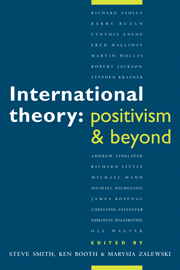Book contents
- Frontmatter
- Contents
- List of contributors
- Preface and acknowledgements
- Introduction
- I Debates
- II Legacies
- III Silences
- IV Openings
- V Directions
- 14 The last post?
- 15 Probing puzzles persistently: a desirable but improbable future for IR theory
- 16 The future of international relations: fears and hopes
- 17 75 years on: rewriting the subject's past – reinventing its future
- 18 ‘All these theories yet the bodies keep piling up’: theories, theorists, theorising
- Index
16 - The future of international relations: fears and hopes
Published online by Cambridge University Press: 09 March 2010
- Frontmatter
- Contents
- List of contributors
- Preface and acknowledgements
- Introduction
- I Debates
- II Legacies
- III Silences
- IV Openings
- V Directions
- 14 The last post?
- 15 Probing puzzles persistently: a desirable but improbable future for IR theory
- 16 The future of international relations: fears and hopes
- 17 75 years on: rewriting the subject's past – reinventing its future
- 18 ‘All these theories yet the bodies keep piling up’: theories, theorists, theorising
- Index
Summary
Three-quarters of a century of IR: a balance-sheet
No crisis, no academic discipline. As E. H. Carr himself stressed, IR like all academic subjects emerged as a distinct academic discipline because of a particular crisis in modern society, in this case that of relations between states (Carr, 1981, pp. 8–9). If there had been no need for a distinct discipline during the period of the long peace between great powers of the nineteenth century, there was certainly one from August 1914 onwards: IR responded, as much as did economics, sociology or geography to particular contemporary needs. This did not mean that ‘international relations’, as reality or as a set of ideas, originated with the First World War, but rather that it was at that historical point that a particular kind of reflection upon it was institutionalised: the subsequent development of theory and the use of history, be it that of inter-state relations or of ideas about such relations, have served to illuminate present concerns.
Set against this backdrop, the discipline of International Relations finds itself, three-quarters of a century after the founding of the Aberystwyth chair, in a situation marked by both great opportunity and some danger. The opportunities arise from the achievements of the discipline and the particular, intellectual and historical, context in which the subject now finds itself. On the one hand, it is a well established academic discipline, with an institutional emplacement and a substantial specialist, theoretical and analytic, literature; on the other hand, it represents an area of considerable intellectual attraction, be it at the level of student demand, or that of broader interest within the social sciences.
- Type
- Chapter
- Information
- International TheoryPositivism and Beyond, pp. 318 - 327Publisher: Cambridge University PressPrint publication year: 1996
- 5
- Cited by



